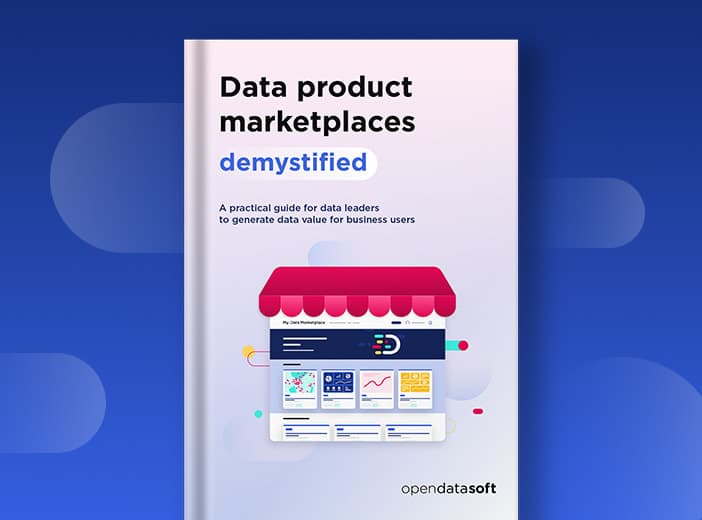Glossary
Data product marketplace
A data product marketplace is a standardized, centralized collaborative platform that promotes and enables the consumption of data products and other data assets.
What is a data product marketplace?
A data product marketplace is a standardized, centralized collaborative platform that promotes and enables the consumption of data products and other data assets. It delivers this through an intuitive, e-commerce marketplace-style experience for users, providing a one-stop shop to discover and consume data products or other assets.
A data product marketplace brings together three key audiences
- Data consumers who can seamlessly discover and access the information they need through a self-service experience, as well as interact with and question data producers, rate data products and provide feedback
- Data producers are able to easily publish and promote data products and other data assets, engage with users, and act on their feedback to drive improvements
- Data governance teams and administrators can monitor and manage data usage, ensure security and compliance, and pinpoint user needs for new data products through data lineage
A data product marketplace can be internal, shared externally with selected partners/customers (an ecosystem data marketplace) or be a public data marketplace (with information available to all as open data). Data can be available freely to qualified users or charged for through data monetization.
A data product marketplace is independent of the underlying systems used to create and manage data or where it is located. Essentially, it adds a level of commercialization to a company’s data catalog, moving from providing a technical data inventory to making data understandable, shareable, and consumable at scale.
What is the difference between a data marketplace and a data product marketplace?
Both a data marketplace and a data product marketplace provide a centralized, self-service space for sharing and consuming data, aiming to deliver the last mile connection between users and an organization’s data. They share an intuitive e-commerce style interface and provide feedback, collaboration, and data quality tools.
The key difference is that data product marketplaces are designed specifically to increase the creation and consumption of data products. Data products are high-value, ready to consume data assets that have been created to meet a specific business need for a large number of users, and are governed through a data contract. They are recognized as a key way to deliver greater value and ROI from data.
Data product marketplaces are therefore a step forward from data marketplaces, adding capabilities focused on data product creation, promotion, and consumption to existing features.
What is the difference between a data catalog and a data product marketplace?
There are three main differences:
- A data catalog provides an inventory of all of an organization’s data – however, it does not allow users to directly access the data through self-service
- A data catalog is a technical tool, and does not meet the needs of business users. Rather than a seamless user experience, it requires training and technical skills to use, limiting it to data teams
- A data catalog does not support the creation, promotion or sharing of data products
Advanced data product marketplaces now include a built-in data catalog or provide the ability to integrate directly with an existing data catalog solution to maximize ROI.
What are the benefits of a data product marketplace?
Data product marketplaces scale data consumption by publicizing and building trust in data products and making them as easy to access as making a purchase on an e-commerce marketplace.
This delivers benefits for data producers, data users and data teams:
- Improved productivity for data teams
- Improved productivity for business users
- Greater innovation through the creation of new digital service offerings
- Higher ROI on existing investment in data tools and programs
- Greater transparency and risk management around compliance
What are the components of a data product marketplace?
Key features include:
- A data catalog to inventory all of an organization’s data
- Metadata management to support governance and discoverability
- Robust, granular access control to ensure data security, confidentiality and compliance
- The ability to connect with all existing systems within the data and tech stack
- Data products, governed by data contracts
- Scalability through multi-cloud and sovereign cloud hosting
- A user-centric experience, with an intuitive e-commerce marketplace style-interface


